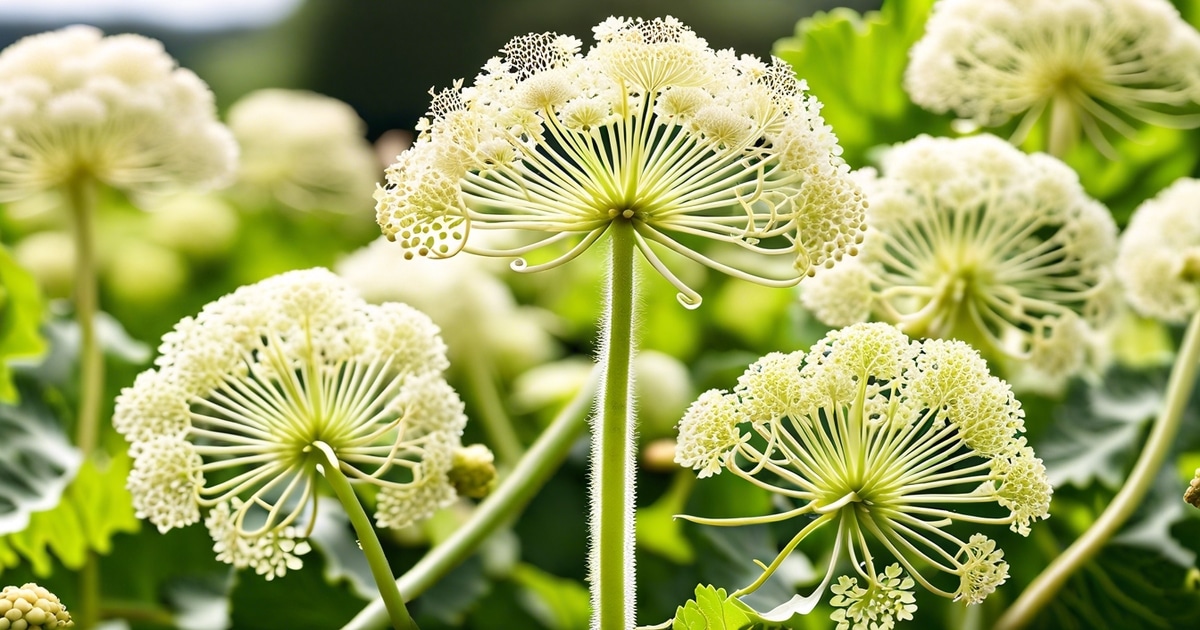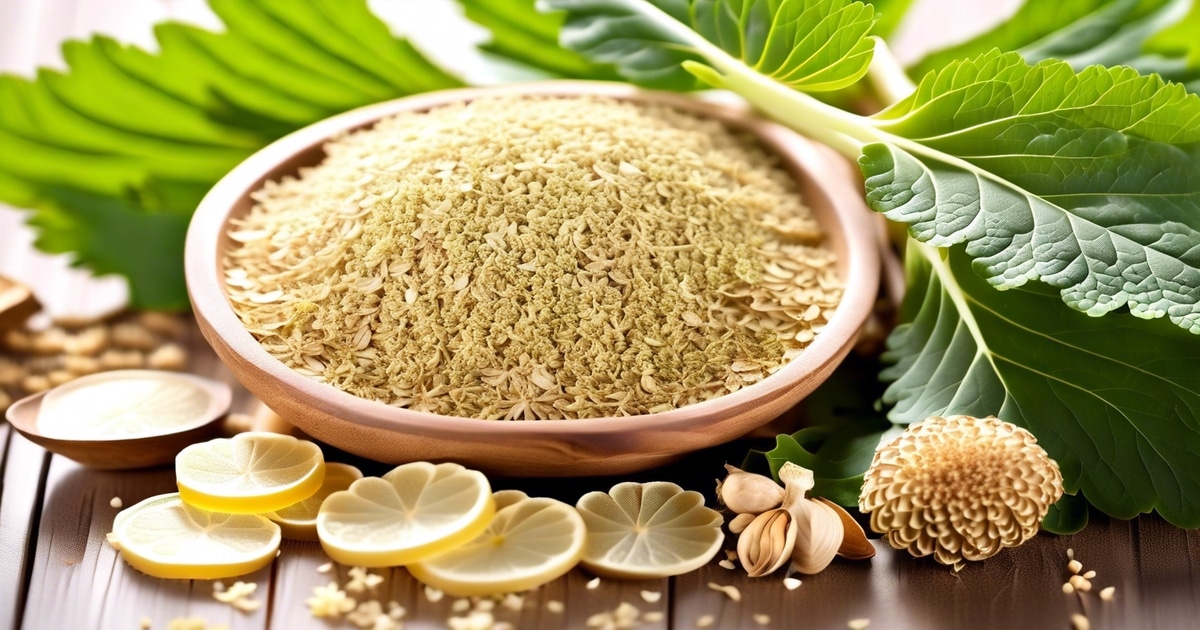Key Takeaways
- Explore Traditional and Modern Uses: Angelica root, an herbal remedy, has a rich history in traditional medicine and offers various modern applications for health and wellness.
- Leverage Anticancer and Antimicrobial Benefits: The phytochemical constituents in angelica root, a medicinal plant, exhibit potential anticancer and antimicrobial properties, supporting overall health.
- Harness Digestive, Respiratory, and Circulatory Support: An angelica root supplement can aid in digestive health, respiratory conditions, and circulatory system functions.
- Exercise Caution with Dosage and Interactions: It is crucial to adhere to recommended dosages, be aware of precautions, and understand potential interactions and side effects with other medications.
- Promote Sustainable Harvesting Practices: Supporting sustainable harvesting and cultivation practices ensures the preservation of angelica roots for future generations.
- Select Quality Supplements Mindfully: When sourcing angelica supplements, prioritize quality, reputable sources, proper storage, and research to maintain efficacy.
- Let’s learn about angelica root herbal medicine!
Traditional Uses and Modern Applications of Angelica Root

Centuries-old Remedies
Angelica root, a staple in traditional medicine, has been used for generations to address various health issues. Its versatility shines through in treating digestive disorders, respiratory problems, and menstrual irregularities. The herb’s long history of use showcases its efficacy across different cultures. Angelica root’s ability to soothe stomach discomfort and aid digestion has made it a go-to remedy for centuries. People have relied on this herbal medicine to alleviate bloating, indigestion, and other gastrointestinal issues effectively. The herb’s anti-inflammatory properties can help ease symptoms of respiratory conditions like coughs or bronchitis.Modern Discoveries
While angelica root continues to be valued in traditional practices, modern research has unveiled new applications for this potent herb. Scientists have identified additional benefits, such as its potential as an immune booster due to its antiviral properties. Moreover, studies suggest that angelica root may possess antioxidant effects that could contribute to overall health and well-being.- Pros:
- Versatile remedy for digestive problems
- Effective in soothing respiratory ailments
- Potential immune-boosting qualities
Phytochemical Constituents and Their Biological Activities
Coumarins, Flavonoids, and Polysaccharides
Angelica root is rich in coumarins, flavonoids, and polysaccharides. These compounds are responsible for various biological activities found in the herb. Coumarins aid blood circulation, flavonoids have antioxidant properties, and polysaccharides support the immune system. The presence of these phytochemicals gives angelica root its diverse range of medicinal properties. Flavonoids help combat oxidative stress by neutralizing harmful free radicals in the body, and polysaccharides are crucial in enhancing immune function by stimulating white blood cell activity.- Pros:
- Supports blood circulation
- Provides antioxidant benefits
- Boosts immune system function
- Cons:
- May interact with certain medications
- Allergic reactions in some individuals
Essential Oils for Aromatic Properties
Essential oils in angelica root contribute to its distinct aroma and potential therapeutic benefits. These oils contain volatile compounds that offer various health advantages when used appropriately. The aromatic nature of essential oils also enhances their usability for aromatherapy purposes. The essential oils extracted from angelica root can be utilized through herbal preparations like teas or topical applications such as aromatherapy massages or skin treatments.- Use essential oil-infused products cautiously.
- Consult a healthcare provider before using essential oil-based remedies.
- Always follow recommended dilution guidelines for safe usage.
Angelica Root’s Anticancer and Antimicrobial Properties
Cancer-Fighting Potential
Angelica root has shown anticancer properties in studies, hindering tumor growth. Its bioactive compounds could be promising for cancer treatment. Studies have demonstrated angelica root’s ability to inhibit tumor growth, suggesting its potential as an alternative treatment option for cancer. The herbal remedy may hold key components that can combat cancer cells effectively.Antimicrobial Activity
In addition to its anticancer benefits, angelica root also displays strong antimicrobial activity against various bacteria and fungi. This property makes it a valuable resource in fighting microbial infections naturally. The antimicrobial activity of angelica root extends to a wide range of bacteria and fungi, showcasing its effectiveness in combating infections without synthetic drugs.Digestive, Respiratory, and Circulatory Benefits
Gastrointestinal Support
Angelica root is known for aiding digestion and easing stomach discomfort. It has been used traditionally to address issues like functional dyspepsia. Studies on animal models have shown promising results in improving digestive health. Angelica root can be a valuable dietary supplement for individuals experiencing digestive problems such as bloating or indigestion. Its properties help soothe the stomach lining and promote healthy digestion, benefiting overall gut health.Respiratory Health
The potential benefits of angelica root extend to respiratory wellness. It acts as an expectorant, which makes it effective in managing respiratory conditions like coughs and bronchitis. Incorporating angelica root into herbal remedies can relieve chest congestion and aid in clearing the airways.Dosage, Precautions, and Interactions
Recommended Dosage Guidelines
When using angelica root supplements or extracts, adhering to the recommended doses is crucial. Exceeding the suggested amount can lead to adverse side effects, such as digestive issues or allergic reactions. To ensure safety and effectiveness, always follow the instructions provided on the product packaging or consult a healthcare professional.Precautions for Pregnant Women
Pregnant women should avoid consuming angelica root due to its potential uterine-stimulating effects. This herb could potentially trigger contractions and increase the risk of miscarriage. It’s essential for expecting mothers to steer clear of angelica root during their pregnancy to safeguard their health and that of their baby.Sustainable Harvesting and Cultivation Practices

Ensuring Long-Term Availability
Sustainable harvesting practices are crucial for the continued availability of angelica root in its natural habitat. The plant’s population can replenish itself over time by only collecting mature roots. This method helps maintain a healthy ecosystem where angelica root thrives.- Pros:
- Preserves biodiversity
- Supports long-term availability
Controlled Cultivation Environments
Cultivating angelica root in controlled environments offers a sustainable solution to meet the rising demand for this herbal medicine. Producers can regulate factors like sunlight and water by growing it indoors or in greenhouses, optimizing growth conditions.- Cons:
- Requires initial investment
- Relies on technology
How to Source and Store Quality Angelica Supplements
Sourcing Angelica Supplements
When looking for angelica root herbal medicine supplements, opt for well-known brands known for their commitment to quality. Check if the brand emphasizes purity and sources ingredients sustainably. Choose products that are organic and free from additives or fillers. Reputable brands often provide information on their sourcing practices, ensuring transparency.- Look for reputable brands prioritizing quality.
- Opt for organic products without additives.
- Ensure transparency in sourcing practices.
Storing Angelica Supplements
Store supplements in a cool, dry place away from direct sunlight to preserve the potency of angelica root herbal medicine. Moisture can degrade the quality of the product, so ensure containers are airtight. Avoid exposing angelica supplements to heat, which can negatively impact their beneficial properties.Final Remarks
You’ve delved into the world of angelica root, uncovering its ancient uses and modern-day applications. From its phytochemical constituents to its potential anticancer properties, this herb packs a powerful punch. Whether it’s aiding digestion, boosting respiratory health, or enhancing circulation, angelica root has proven its worth time and time again. Remember to approach dosages with caution and be mindful of potential interactions. Embrace sustainable practices when sourcing this botanical gem for your herbal arsenal. Now that you know about angelica root’s benefits and precautions, why not explore incorporating it into your wellness routine? Whether as a supplement or in culinary creations, this herb could be your ticket to a healthier lifestyle. Keep learning, experimenting, and reaping the rewards of nature’s potent remedies.Frequently Asked Questions
Is angelica root commonly used in traditional herbal medicine practices?
Yes, angelica root has a rich history of use in traditional herbal medicine across various cultures for its medicinal properties. It is renowned for its diverse therapeutic benefits and has been employed for centuries to address various health concerns.What are the key phytochemical constituents of angelica root and their biological activities?
Angelica root contains essential compounds such as coumarins, flavonoids, and volatile oils that contribute to its medicinal properties. These constituents exhibit antioxidant, anti-inflammatory, and antimicrobial activities, which are crucial in promoting health and well-being.What Are the Health Benefits of Angelica Root?
Angelica root is believed to offer a range of health benefits. It has long been used in traditional medicine to aid digestion, reduce inflammation, and improve overall wellness. The health benefits of angelica root also include potential immune-boosting and anti-anxiety properties, making it a versatile herbal remedy.

